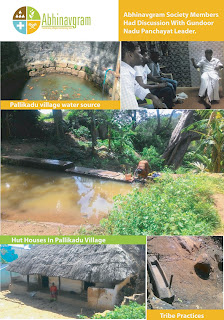ABOUT
ABHINAVGRAM SOCIETY
The
Abhinavgram Society was registered on 22nd of June 2015 under the
Tamil Nadu Society’s Registration Act 1975 and Rules 1978. The Abhinavgram were
initiated by a group of friends of Gandhigram Rural University, Madras School
of Social Work, Holy Cross College, American college, Bharathidasan and
Bharathiar Universities. The organization aims at creation of model villages
with the vision of create self-sufficient villages with people enjoying a heightened
state of mental, physical, spiritual and social wellbeing. The villages that
are remote, having no access to any developmental schemes and lacking basic
amenities and infrastructure are chosen to be the target of developmental
activities.
At
the outset the team has conducted the pilot study at Kolli hills from March
2014 to May 2015; after the pilot study and visits to kolli hills, the society
has adopted two village Panchayats of Prakkarainadu and Gundoornadu who met the
above said criteria. Both the villages
have 700 households each inhabited by tribal people. As these villages are
remote, the mainstream development has not yet touched the villages at all.
There is no proper transportation and medical facilities etc.
By
collaborating with various governmental and nongovernmental agencies as well as
by implementing need based projects in a participatory manner the organization
is looking forward to bring about developmental change in all the villages
around this region that is thickly populated by the tribes.
Aim
To promote
standard living condition of
the rural people
in a sustainable manner through creating
MODEL
VILLAGES
Vision
To
create self-sufficient villages with people enjoying a heightened state of
mental, physical, spiritual and social wellbeing.
Mission
To
act as a catalyst in overall development and transformation of villages through
participatory research, assessment and implementation of development programs
and facilitating liaison, realizing the present and future needs of the
community.
Main
Objectives
ü
To enhance rural
livelihood by creating more opportunities to work and generating new income
sources and community assets
ü
To develop existing
resources by introducing environment friendly, sustainable and scientific practices
and ensuring its utilization through proper training.
ü
To enhance basic
educational facilities ensuring its quality for benefiting the next generation
ü
To provide basic health
facilities and ensure proper utilization of those facilities through awareness
generation and promotion of health behaviours. Teritiary care will be ensured through facilitation.
ü
To offer
psychological services for preventing mental illness to occur and if
occurred to ameliorate it. Psychological services will be also rendered to deal
with addiction and relationship issues at the family and community level.
ü
To seek empowerment of
women through entrepreneurship development training.
ü
To ensure proper
support to the vulnerable population and marginalized families including aged,
orphans, HIV/AIDS infected persons, transgendered, mentally and physically
challenged people and those belonging to schedule castes and tribes
ü
To facilitate marketing
of products by creation of farmer’s market and partnering with agencies.
ü
To work with other
agencies in liaison to address the transportation and communication needs of
the villagers thereby bringing them to the mainstream of society.
ü
To undertake research
activities, from time to time, either by self or in collaboration with other
institutions or agencies to ensure the progress in the right direction.
ü
To facilitate manpower
development in the field of community development by providing field training
opportunities to students from various institutions in and out of the
country
ü
To become a catalyst in
development of rural tourism through organizing village fests promoting rural
cultural and aesthetic values.

























